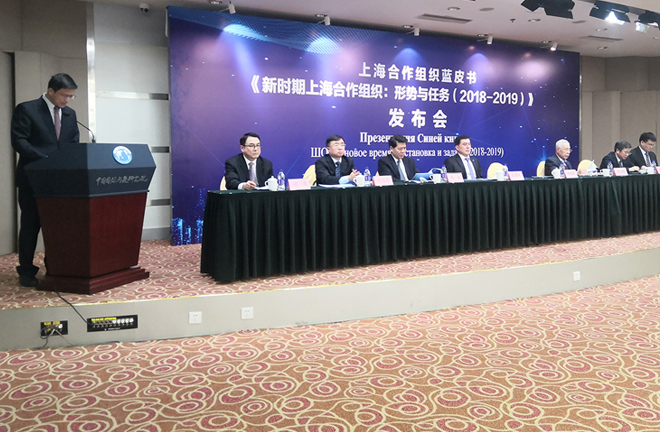SCO boosts cross-regional integrated development

A presentation for the SCO blue book was held in Beijing on Dec. 16. Photo: YAN YONG/CSST
Recent data show that the economic potential of the Shanghai Cooperation Organization (SCO) is yet untapped, and thus members should solve relevant problems and simplify trade rules so as to ensure unimpeded economic and trade exchange, said an official at a recent conference held in Beijing.
The remarks were made at the presentation of the SCO blue book, Shanghai Cooperation Organization in the New Era: Situation and Task (2018–2019). The conference covered issues regarding the current situation and the future of the organization.
Qi Zhenhong, director of the China Center for Shanghai Cooperation Organization Studies, said that the organization first started to expand membership by incorporating Pakistan and India in 2017, an epoch-making event signifying the organization has entered a new historical era.
The SCO is currently the biggest regional organization in the world, with its members spanning 60% of the Eurasian continent and representing nearly half of the global population. The aggregate of the member states’ GDP accounts for nearly a quarter of the global GDP.
SCO Secretary-General Vladimir Norov said that security and stability in the region remain the priority of the organization. In recent years, the Regional Anti-Terrorist Structure of the SCO has made great achievements in combating terrorism, separatism and extremism. The organization has also made important contributions to global endeavors in drug control.
According to Kuvanychbek Shadybekov, deputy head of the Executive Office of the Government of the Kyrgyz Republic, a series of cooperative forms and methods have taken shape among the member states while they work together to build a mechanism that guides their work in various fields. In a way, the SCO has successfully achieved its goals of addressing many global challenges and maintaining regional security.
Shadybekov noted that implementing the economic and trade cooperation between the B&R and the Eurasian Economic Union within the framework of the SCO will facilitate the transportation of goods and services among member states, thus tapping the full potential of the region. Furthermore, member states should set up free trade areas and transit corridors, and they should enhance cooperation in passenger and freight transport. In doing so, states within the region will be further connected.
Norov added that the SCO should prioritize member states’ cooperation in transportation, energy, e-commerce, information and communication technology, and tourism and finance. In terms of trade and investment, member states should expand cooperation in local currency settlement. Norov stressed that member states should actively work together to build infrastructure. The SCO should consider building a rail freight corridor that connects China and Europe by way of Kazakhstan and Russia. Meanwhile, member states should simplify customs procedures and vigorously develop e-commerce. The development of e-commerce will give rise to more job opportunities for women and youth in the region, which benefits social stability and regional security.
edited by NIU XIAOQIAN
